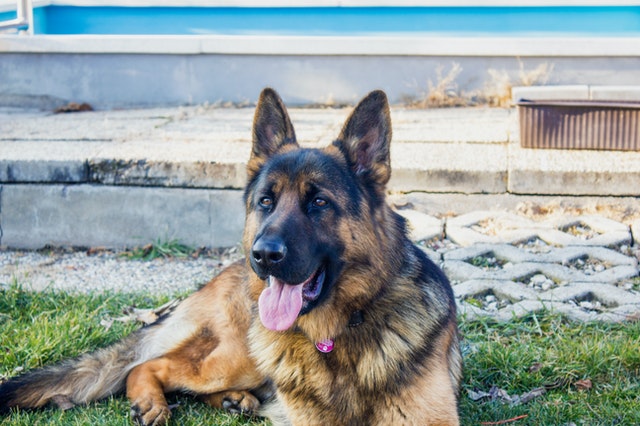German Shepherd
About The German Shepherd

The German Shepherd Dog, one of the most commonly recognised breeds in the world, is a strong, alert dog with a noble, royal demeanour. The German Shepherd is a large dog with a large presence. They are agile and well balanced, and they carry themselves with pride. Short or long coats are OK, but should not be extremely fluffy.
The German Shepherd Dog, also known as the Alsatian in the United Kingdom and other areas of Europe, is one of the top ten most popular dog breeds in the United Kingdom and is likely one of the world's best recognised breeds.
Other than becoming a movie star, the German Shepherd has done a variety of duties, including leading the blind, tracking down criminals, smelling out illicit substances, serving in the military, visiting the sick, and herding sheep.
Although the German Shepherd embodies some of the greatest qualities of dogs, they are not for everyone. This is a high-energy dog that was originally intended to herd flocks all day. It requires a lot of action and exercise. They're more likely to communicate their boredom and displeasure in ways you don't enjoy, like as barking and chewing, if they don't have it.
The breed is also distant and distrustful, which is ideal for a watchdog but not for a family dog who would make guests feel welcome. However, if a German Shepherd is exposed to a variety of settings and people from the time they are puppies, they can learn to accept new people and surroundings.
History
Originally a herding dog – although not in the traditional sense - the German Shepherd acts as a living fence, strolling or running an invisible line between sheep and territory they must be kept away from, keeping animals where they belong. They would discreetly reintroduce a sheep that had strayed from the flock without barking - which would scare the entire flock. They are descended from a variety of distinct sheepherding dogs and date all the way back to the seventh century.
Personality
The German Shepherd, dubbed the 'one man (or woman) dog,' develops a deep, loving, and tight attachment with their handler and will desire to spend as much time with them as possible. Their loyalty is evident, but over the last few decades, many breeders wanting to encourage their natural guarding instincts have chosen for uneasy animals that alert more quickly due to a lack of confidence and are prepared to employ aggressiveness first rather than last.
A well born and raised German Shepherd should be courageous, confident, fast and clever, and always calm and steady enough to listen to their owner or handler regardless of the situation. They are eager to learn and are relatively easy to teach when treated with love, good reinforcement, and patience.
The German Shepherd personality is reserved yet not aggressive. They're reticent dogs who don't make friends easily, but once they do, they're devoted. They are easygoing and accessible with their family, but when attacked, they can be powerful and protective, making them great watchdogs.
They are not excellent at being alone for lengthy periods of time. They get bored and dissatisfied if they do not have the company they require, as well as exercise and the opportunity to put their brains to use. A German Shepherd who is under-exercised and disregarded by their family is more prone to exhibit pent-up energy in undesirable ways, such as barking and chewing.
The German Shepherd, like other dogs, requires early socialisation (introduction to a variety of people, sights, noises, and experiences) while they are young. Socialization ensures that your German Shepherd puppy develops into a well-rounded dog.
This extremely intelligent and trainable breed craves on a work—any job. From alerting a deaf individual to a doorbell ringing to sniffing out an avalanche victim, the German Shepherd can be trained to perform practically anything.
Care
Expect difficulty if you leave them alone for lengthy periods of time without exercising them. Boredom and idleness result in behavioural issues like as chewing, digging, and barking. The German Shepherd need both physical and mental exercise (jogging, romping at the dog park) (training exercises like agility or obedience competitions).
German Shepherds, which were originally raised to herd flocks all day, are made for action. This means they have a lot of energy that they need to expend through regular activity.
German Shepherds, like many herding breeds, bark. Barking isn't always a bad thing, but it might be if the dog is bored. The "Quiet" command should be included in every German Shepherd's obedience training.
German Shepherds like chewing and have strong jaws that can demolish most objects. They can injure their teeth, ingest something that makes them ill, or even choke if they choose the incorrect object to munch on. Give your dog safe chew toys and bones so they may occupy themselves while you're not playing with them.
Children
This is a large dog, though, and it is capable of accidentally bumping a toddler or young child. True to their reserved character, they are not very sociable with children they don't know, but they are typically trustworthy.
The German Shepherd may also coexist peacefully with other canines and pets if taught to do so from puppyhood. If the dog isn't used to getting along with other dogs or cats, introducing an adult German Shepherd to a household with other pets might be more challenging. You might need to engage a professional trainer or seek guidance from the rescue group where you got the adult German Shepherd.
A German Shepherd is an excellent companion for children if it is well-trained and has had ample of exposure to youngsters, particularly as a puppy. In fact, some describe them as a mix between a babysitter and a cop, being both compassionate and protective of their family's youngsters.